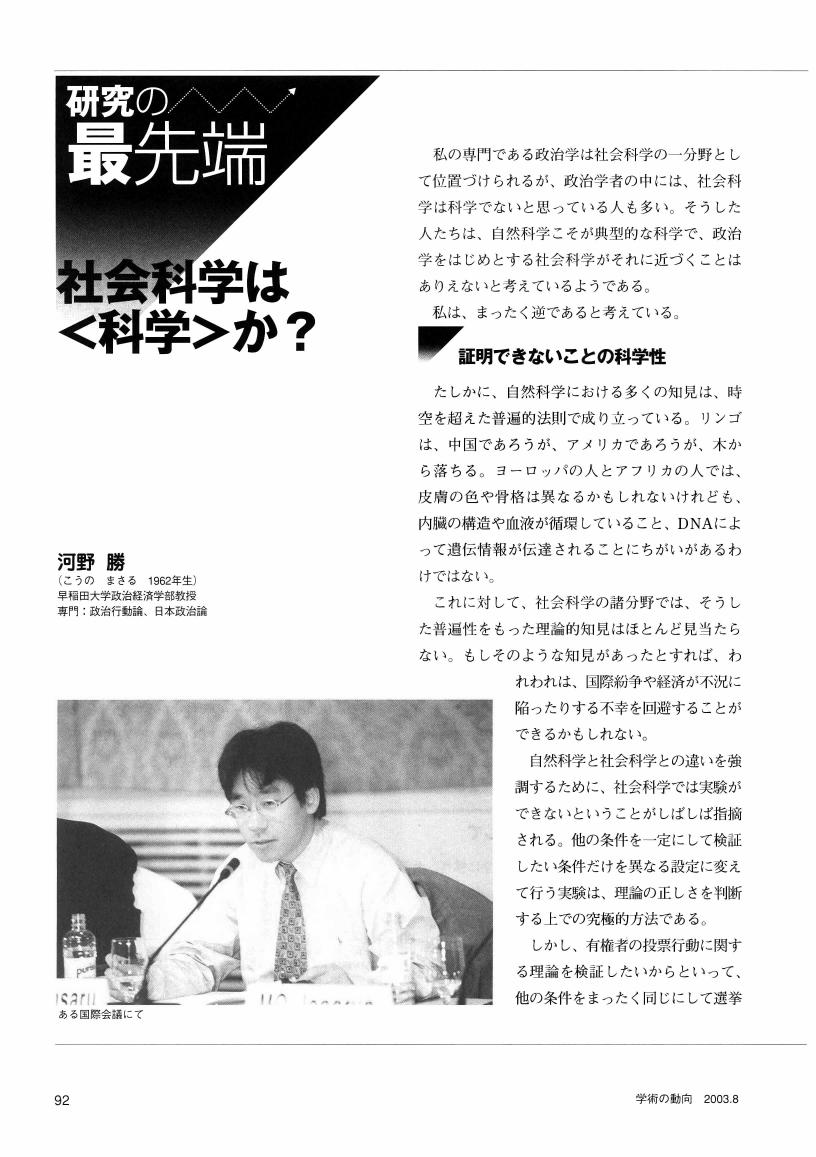18 0 0 0 IR 政治学における実験研究
- 著者
- 河野 勝
- 出版者
- 早稻田大學政治經濟學會
- 雑誌
- 早稻田政治經濟學雜誌 (ISSN:02877007)
- 巻号頁・発行日
- vol.391, pp.7-16, 2016-09-30
14 0 0 0 OA シュンペーターの民主主義理論-その現代性と課題-
- 著者
- 河野 勝
- 出版者
- JAPANESE POLITICAL SCIENCE ASSOCIATION
- 雑誌
- 年報政治学 (ISSN:05494192)
- 巻号頁・発行日
- vol.50, pp.181-203, 1999-12-17 (Released:2009-12-21)
- 被引用文献数
- 1
- 著者
- 河野 勝
- 出版者
- 岩波書店
- 雑誌
- 日本政治学会年報政治学 (ISSN:05494192)
- 巻号頁・発行日
- no.1999, pp.181-203, 1999
6 0 0 0 OA 社会科学は〈科学〉か?
- 著者
- 河野 勝
- 出版者
- 公益財団法人 日本学術協力財団
- 雑誌
- 学術の動向 (ISSN:13423363)
- 巻号頁・発行日
- vol.8, no.8, pp.92-93, 2003-08-01 (Released:2009-12-21)
5 0 0 0 虚の拡散にどう対処するか (特集 フェイクニュースが世界を覆う)
- 著者
- ハミルトン ジェームズ ジェイ アレキサンダー 河野 勝
- 出版者
- 中央公論新社
- 雑誌
- 中央公論 (ISSN:05296838)
- 巻号頁・発行日
- vol.131, no.7, pp.68-75, 2017-07
4 0 0 0 OA 大手メディア8社の内閣支持率の考察 現代世論調査の現状と課題
- 著者
- 三村 憲弘 河野 勝
- 出版者
- 公益財団法人 日本世論調査協会
- 雑誌
- 日本世論調査協会報「よろん」 (ISSN:21894531)
- 巻号頁・発行日
- vol.129, pp.21-29, 2022-03-31 (Released:2023-03-31)
4 0 0 0 OA 政治経済学とはなにか
- 著者
- 河野 勝
- 出版者
- 早稻田大學政治經濟學會
- 雑誌
- 早稲田政治経済学雑誌 = The Waseda journal of political science and economics (ISSN:02877007)
- 巻号頁・発行日
- vol.356, pp.27-39, 2004
- 著者
- 飯田 博之 河野 勝行 武田 光能
- 出版者
- The Kansai Plant Protection Society
- 雑誌
- 関西病虫害研究会報 (ISSN:03871002)
- 巻号頁・発行日
- vol.54, pp.171-173, 2012 (Released:2012-09-01)
- 参考文献数
- 5
- 被引用文献数
- 2 1
3 0 0 0 OA 外来種トモンヨモギヒメヨコバイ(新称)の三重県からの発見と国内での新規寄主植物
- 著者
- 河野 勝行
- 出版者
- 関西病虫害研究会
- 雑誌
- 関西病虫害研究会報 (ISSN:03871002)
- 巻号頁・発行日
- vol.64, pp.116-118, 2022-05-31 (Released:2022-06-01)
- 参考文献数
- 18
Eupterix decemnotata Rey (Hemiptera: Cicadellidae: Typhlocybinae), an exotic species originating from Europe, was discovered in Mie Prefecture for the first time in two host plants, Salvia rosmarinus Schleid. and Mentha suaveolens Ehrh. (Lamiales: Lamiaceae). Notably, M. suaveolens is a host plant that is new to Japan. Since this insect did not have a trivial name in Japanese, the trivial name in Japanese “Tomon Yomogi Hime-yokobai” has been proposed for the insect species.
3 0 0 0 OA 政治学における実験研究
- 著者
- 河野 勝
- 出版者
- 早稻田大學政治經濟學會
- 雑誌
- 早稻田政治經濟學雜誌 (ISSN:02877007)
- 巻号頁・発行日
- vol.391, pp.7-16, 2016-09-30
- 著者
- 河野 勝
- 出版者
- 日本政治学会
- 雑誌
- 年報政治学 (ISSN:05494192)
- 巻号頁・発行日
- vol.45, pp.195-210, 1994-12-22 (Released:2009-12-21)
3 0 0 0 OA 他者への支援を動機づける同情と憐れみ ―サーベイ実験による道徳的直観の検証―
- 著者
- 河野 勝 三村 憲弘
- 出版者
- 日本政治学会
- 雑誌
- 年報政治学 (ISSN:05494192)
- 巻号頁・発行日
- vol.66, no.1, pp.1_61-1_89, 2015 (Released:2018-06-10)
- 参考文献数
- 22
This paper explores the nature of human moral intuition which motivates us to assist others in hardship. Building upon the idea originally developed by Hannah Arendt, we distinguish “compassion” and “pity” as different mental sources, arguing that each entails a distinct pattern through which the institution is translated into or attitudes and behavior. More concretely, we hypothesize that two variables are particularly relevant in determining these patterns: the degree of familiarity with the environment in which the hardship is taking place, and the number of identifiable people who face the hardship. Survey experiments we conducted in August and December 2012 support this hypothesis, showing that the level of willingness to assist others is affected most significantly by the location of the hardship. The findings also suggest that the sentiment of pity motivates our willingness in the context of foreign countries, while the feeling of compassion dominates our intuition and ironically constrains our willingness in the case of the hardship taking place in our own country. The paper discusses the normative implications drawn from these empirical findings and concludes that the two areas of political science, normative theory and positive analysis, must be more integrated in future research.
3 0 0 0 日中・日韓双方向間の機械翻訳メールシステム
3 0 0 0 OA エリサンを用いたシダの耐虫性に関与する毒性·成長阻害活性因子の検定
- 著者
- 今野 浩太郎 平山 力 中村 匡利 田村 泰盛 服部 誠 河野 勝行
- 出版者
- 社団法人 日本蚕糸学会
- 雑誌
- 日本蚕糸学会 学術講演会 講演要旨集 日本蚕糸学会第72回学術講演会
- 巻号頁・発行日
- pp.118, 2002 (Released:2004-02-03)
エリサン(Samia riciniヤママユガ科)は味覚が鈍感であり、たとえ毒性や成長阻害活性を持つ植物でも与えれば良く摂食し、その植物に特有の反応を示すため、植物の毒性や成長阻害活性の検出に大変優れた昆虫である。シダを食害する植食昆虫の種数は、植物1種当たり平均で、被子植物と比較して顕著(1/30)に少ないことが知られているが、その理由については未知であるため、エリサンを用い、ヒメシダ、コウヤワラビ、ゼンマイ、ワラビ、ヒカゲヘゴ等の毒性·成長阻害活性を調べた。その結果、草食哺乳類に対する毒性が知られているワラビが、エリサンに対し中程度の毒性·成長阻害活性しか示さなかった一方で、ヒメシダ、コウヤワラビ·ゼンマイなど、これまでに毒性·成長阻害活性が報告されていないシダに毒性に近い非常に強い成長阻害活性が観察された。特に、ヒメシダ(Thelypteris palustris )の生葉や、生葉粉を栄養価の高い人工飼料に混ぜた餌を与えた場合、エリサンは摂食するが全く成長しなかった。この活性は熱に弱く、100℃数分間の加熱で完全に失われた。また、この活性は水、リン酸緩衝液、アルカリ緩衝液、メタノール、界面活性剤などに対し極めて難溶性で葉残渣画分に残った。これらの性質は、シダが一般的に植食昆虫耐性を持つことの原因とされているファイトエクジステロイド、チアミン分解酵素、青酸配糖体の性質とは非常に異なっており、シダに未知の耐性機構が存在する可能性が示唆された。
3 0 0 0 OA 政治制度の選択と機能分析
2 0 0 0 OA 上賀茂地域における自然と文化に関する調査と住民との協働による保全継承手法の研究
2 0 0 0 OA 政治変動と日本人の意志決定のメカニズム-心理学・経済学実験と全国世論調査の統合-
- 著者
- 田中 愛治 河野 勝 清水 和巳 山田 真裕 渡部 幹 西澤 由隆 栗山 浩一 久米 郁男 西澤 由隆 長谷川 真理子 船木 由喜彦 品田 裕 栗山 浩一 福元 健太郎 今井 亮佑 日野 愛郎 飯田 健
- 出版者
- 早稲田大学
- 雑誌
- 基盤研究(A)
- 巻号頁・発行日
- 2006
本研究では、全国の有権者から無作為抽出した対象者(サンプル)に対し、ノート・パソコンを用いた世論調査(CASI方式)を日本で初めて実施した。さらに、ノート・パソコンによるCASI調査に、認知心理学的視点を加えた政治経済学実験の要素を組み込み、実験を導入した世界初のCASI方式全国世論調査に成功した。これにより、政治変動をもたらす日本人の意志決定のメカニズムの解明を可能にし得る新たな研究を踏み出した。
- 著者
- 前田 寛之 河野 勝宣 辻 健史 久保 仁美 青木 秀晃
- 出版者
- 公益社団法人 日本地すべり学会
- 雑誌
- 日本地すべり学会誌 (ISSN:13483986)
- 巻号頁・発行日
- vol.52, no.1, pp.15-20, 2015 (Released:2015-07-30)
- 参考文献数
- 20
- 被引用文献数
- 2
1 0 0 0 OA 日米関係を考える三つの視点
- 著者
- 河野勝
- 出版者
- 国立国会図書館
- 雑誌
- 日米関係をめぐる動向と展望 : 総合調査報告書
- 巻号頁・発行日
- 2013-08
1 0 0 0 OA 日本におけるヘイトスピーチの心的基盤と法規範形成の研究
本研究の目的は、現行のいわゆるヘイトスピーチ対策法(正式名称:本邦外出身者に対する不当な差別的言動の解消に向けた取組の推進に関する法律)を超える新しい法規範形成の可能性を視野に入れつつ、現代日本のヘイトスピーチに関する心的基盤を実証的に明らかにすることであった。より具体的には、いかなる条件のもとでこのような差別や言葉の暴力を一般の日本人が許容するのか、またその理由は何か、といったヘイトスピーチに関わる心的メカニズムについて、サーベイ実験の手法を用いつつ検討した。





